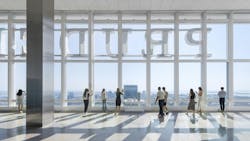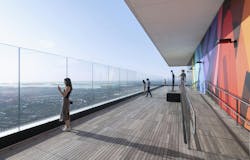Boston’s Prudential Center showcases a new three-floor observatory
Perkins & Will recently released details about and images of View Boston, the three-floor interactive observatory atop the Prudential Tower, which opened for visitors on June 15. P&W’s Boston studio designed the observatory for BXP, the 750-ft-tall building’s owner and the project’s developer.
The observatory provides a panorama of Beantown and its surrounding region. It has its own entrance within the Prudential Center, and elevators with Samsung screens and an interior sound system take visitors to the 52nd floor, named The View, where they can look onto the city vista through the letters of Prudential’s iconic signage.
To create this space, P&W’s team reconfigured the tower’s mechanical system and removed numerous suspended ceilings, walkways, and the solid panel behind the Prudential sign. These upgrades raised the ceiling height to 24 ft, from nine ft, filling the interior wraparound observatory with light.
Guests encounter “specific moments” on tour
The design’s simplicity and minimalism are articulated through a thoughtful placement of windows and doorways, and what P&W calls “a quiet materiality that uses reflectivity and subtle textural cues to guide guests from one episodic experience to the next.” An interior and exterior lighting program, designed in collaboration with LAM Partners, highlights the views and design features of the space.
Matt Pierce, P&W’s Principal who led the design of View Boston, elaborates that visitors encounter “specific moments of interest” as they tour the observatory. Perhaps the most daring allows visitors to step onto the edge of an outdoor roof deck that looks over Boston’s Back Bay neighborhood. The observatory also features an indoor-outdoor bar, a restaurant, and numerous exhibits. Pierce says the architecture supports intuitive wayfinding, as do the observatory’s spaces themselves.
The Pru, which was designed by Charles Luckman & Associates and opened in 1965, has long been an indelible part of Boston’s skyline. But its aging systems required some upgrading to accommodate the addition of the observatory.
An upgrade to the tower’s original mechanical systems allowed BXP and the design teams to reimagine the observatory experience, while elevating the infrastructure to current sustainable, energy efficient standards. Updated cooling systems freed the interior space to house the window washing unit, allowing for the Cloud Terrace—an all-season exterior observation deck and hospitality area on the 51st floor—to take shape where there had been equipment. The installation of a new eight-foot-high frameless glass windscreen makes the outdoor roof deck comfortable and safe while offering a premium viewing experience.
Design features emphasize the view
Where possible, materials were chosen sustainably and locally to celebrate Boston’s history: for example, the flooring used in the Stratus cocktail bar on the 51st floor salvaged “Harbor Oak” made from the piers that formerly supported the once-popular Jimmy’s Harborside Restaurant, which was demolished in 2007.
Other design strategies directed attention towards the view. There is an emphasis on glass, both mirrored and transparent. The décor in Stratus references the elements of air and water. The protected interior space flows seamlessly to the exterior seating area and observation deck through movable glass walls that open or close to suit the weather. Additional noteworthy design features include an edge-lit cast glass bar, created by Lucid Glass Studio and a lighting installation by Yellow Goat Design, featuring a reflective metallic canopy of varying heights that in the evening mimics stars in the night sky. Downstairs in The Beacon, the bar faces outwards and is flanked by mirrored columns with custom shelving that reflect the city below.
Working within the existing building limited the ceiling height in the dining area. A high-gloss panel system was designed for this ceiling to reflect light and add a feeling of openness. The floorplans allow for uninterrupted viewing, providing clear sightlines to windows and portals.
The observatory was designed for guest accessibility. Throughout the three stories of attractions, equity is achieved through tactile models of the skyline for guests with vision impairments, native audio systems for hearing support, quiet moments of rest away from the stimulating activity areas, and restaurant and bar seating tailored for easy wheelchair access.
Collaboration between the exhibition design and operations partners proved crucial to achieving the inclusivity goals of the project. (Programming in the exhibition spaces was helmed by JRA, an immersive technology design agency that’s part of RWS Global.)
The guest journey throughout the observatory features multiple touchpoints for education and storytelling:
•Boston 365, a 3D model of the city with rotating seasonal display content;
•Virtual Viewers and interactive itinerary-planning touchscreens on the 52nd floor highlighting various cultural and historical landmarks, which the guest can capture via his or her smartphone and form the “ViewPrint” travel guide for the region; and
•The Immersive Theater, a 260-degree theater showcasing the “Open Doors” film that highlights a variety of neighborhoods and attractions.



